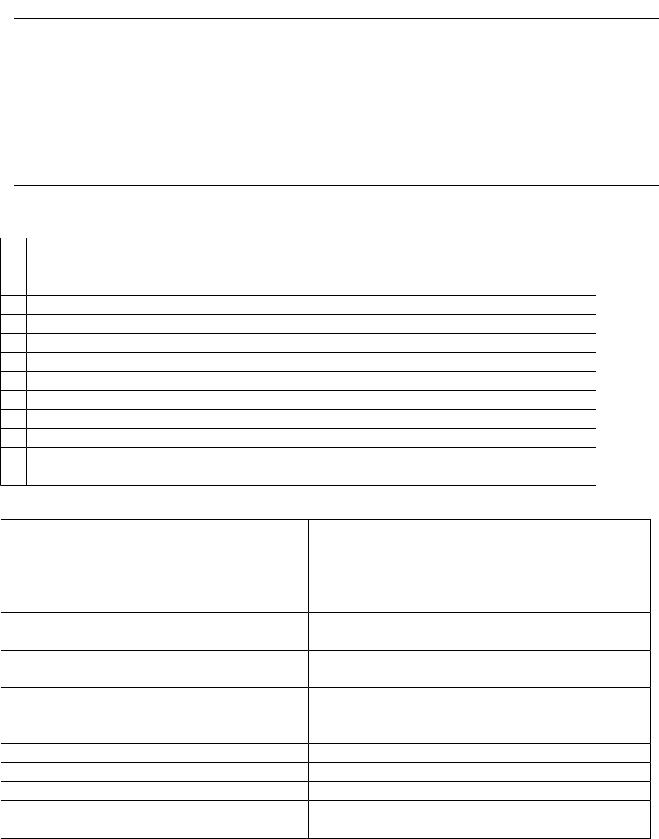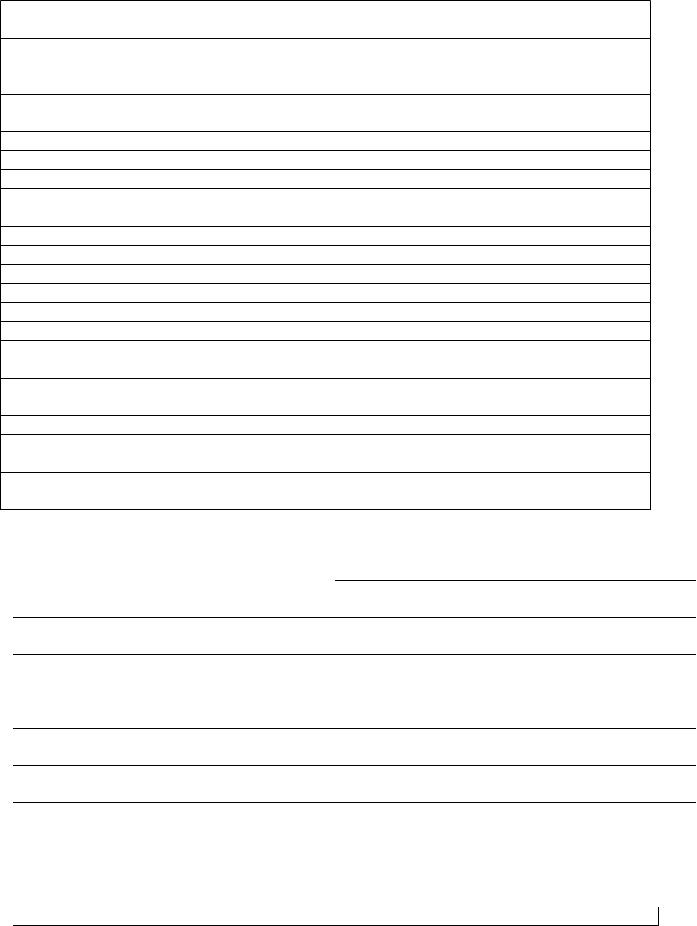
Грамматика. Практикум
.pdf
 11
11  probably the most intelligent of all of us. I am
probably the most intelligent of all of us. I am
 12
12  think Kate she is the nicest and most easy-going
think Kate she is the nicest and most easy-going
 13
13  person in the all family. I would say she is
person in the all family. I would say she is
 14
14  generally a much more happier person than Sarah.
generally a much more happier person than Sarah.
 15
15  And me? Well, I’m a pretty happy most of the time too.
And me? Well, I’m a pretty happy most of the time too.
EXERCISE № 57. Translate from Russian into English.
Его старший сын на три года старше моей старшей сестры.
Он самый старший и самый умный в семье.
Волга гораздо длиннее многих рек в Европе.
На полке больше журналов на английском языке, чем на русском.
Дай мне другую ручку. Эта ручка хуже той.
 Дальнейшие комментарии не нужны.
Дальнейшие комментарии не нужны.  Сегодня нужно послушать последние известия. Президент выступит с обращением к нации.
Сегодня нужно послушать последние известия. Президент выступит с обращением к нации.
 Когда уходит последний поезд?
Когда уходит последний поезд?  Какое животное сильнее: лев или тигр? Мне кажется, тигр так же силен, как и лев.
Какое животное сильнее: лев или тигр? Мне кажется, тигр так же силен, как и лев.
Вы знаете мистера Рипли? - Да, он интереснейший человек.
Чем меньше ты будешь говорить, тем лучше.
 Погода меняется к лучшему.
Погода меняется к лучшему.  Если он не делает уроков, тем хуже для него.
Если он не делает уроков, тем хуже для него.
 Он становился все слабее и слабее.
Он становился все слабее и слабее.
 На этот раз у вас меньше ошибок.
На этот раз у вас меньше ошибок.
 Эта комната в два раза меньше вашей.
Эта комната в два раза меньше вашей.  Этот текст в два раза труднее, чем тот, который мы только что прочитали.
Этот текст в два раза труднее, чем тот, который мы только что прочитали.
Этот сейф очень тяжелый. Он в тричетыре раза тяжелее тех сейфов.
His elder son is three years older than my elder sister (is).
He is the eldest and the cleverest in the family.
The Volga is much longer than many other rivers in Europe.
There are more English magazines than Russian ones on the shelf.
Give me another pen. This pen is worse than that one.
No further commentaries are needed.
We must listen to the latest news today. The President will address the nation today.
When does the last train leave?  Which animal is stronger: a lion or a tiger? It seems to me, a lion is as strong as a tiger.
Which animal is stronger: a lion or a tiger? It seems to me, a lion is as strong as a tiger.
Do you know Mr Ripley? - Yes, I do. He is a most interesting man.
The less you say, the better (it is).
The weather is changing for the better.  If he doesn't do his home assignments, so much the worse for him.
If he doesn't do his home assignments, so much the worse for him.
He got weaker and weaker.  This time you've made fewer mistakes.
This time you've made fewer mistakes.  This room is half as large as yours.
This room is half as large as yours.  This text is twice as difficult as the one we have just read.
This text is twice as difficult as the one we have just read.
This safe is very heavy. It is three-four times as heavy as those safes.
THE ADVERB
EXERCISE № 58. Rewrite each sentence beginning with the words given. Model: Nora is a careless typist. - Nora types carelessly.
1.Her friend is a careful driver. - Her friend drives …………...
2.Ann is a good tennis player. - Ann plays …………...
3.Alex learns slowly. - Alex is a …………...
4.Your mother cooks wonderfully. - Your mother is a …………...
5.Have the children been good today? - Have the children behaved …………...
6.She is an amazing storyteller. - She tells …………...
7.Pat is a bad dancer. - Pat dances …………...

8.The hotel staff were really friendly. - The hotel staff treated us …………...
9.I don't think it's a practical suggestion. - The suggestion doesn't sound …………...
10.Philippa is a hard worker. - Philippa usually works …………...
11.Mr. Green is a successful bookseller. - Mr. Green sells …………...
12.A dishwashing machine is a fantastic time-saver. - A dish-washing machine saves
…………...
13.I don't think the fruit is fresh. - The fruit doesn't look …………...
14.The decorations of the room were lovely. - They decorated the room …………...
15.She runs quickly. - She is …………... .
16.She is an early riser. - She gets up ………….. .
17.I wish you were fast. - I wish you could swim ………….. .
18.Sally is a late comer. - Sally always comes ………….. .
19.My brother-in-law is a bad driver. - My brother-in-law drives …………...
20.My friend is good at writing. - My friend writes …………...
EXERCISE № 59. Ask questions according to the pattern. The prompt words must become the subject of your questions. Make the necessary changes.
Model: Fred speaks English fluently. (Nick) – Does Nick speak English as fluently as Fred?
1. Alec drives the car carefully. (his wife) |
1. |
Does his wife drive the car as carefully as |
|
|
|
Alec? |
|
2. |
Steve usually explains things calmly. (his |
2. |
Does his brother explain things as calmly as |
brother) |
Steve? |
||
3. |
Mary knows English history well. (you) |
3. |
Do you know English as well as Mary? |
4. |
Paul sings beautifully. (his sister) |
4. |
Does his sister sing as beautifully as Paul? |
5. We often go to the library. (you) |
5. |
Do you go to the library as often as we? |
|
6. |
My children will go to the country willingly. |
6. |
Will your children go to the country as |
(your children) |
willingly as mine? |
||
7. |
I seldom went to the country. (you) |
7. |
Did you go to the country as seldom as I did? |
8. |
My son reads a lot. (your daughter) |
8. |
Does your daughter read as much as my son? |
9. |
Nelly and Paul live far from the University. |
9. |
Does Betty live as far from the University as |
(Betty) |
Nelly and Paul? |
||
EXERCISE № 60. Choose the right variant:
1. Their house is very………….., they visit us …………..every week. (near, nearly) 2. I had
………….. taken three steps when I saw a man. (hard, hardly) 3. It was a large snake …………..
eight feet in length, and as thick as the hand of a man. (near, nearly) 4. He was………….. in need of money now. (bad, badly) 5. "Jane," said the teacher, "you are ………….. again. You have been
………….. for almost every class this term." (late, lately) 6. We haven't seen them at the library
………….. (late, lately) 7. She tried ………….. to be on time, but there were always a lot of things to do before school. (hard, hardly) 8. Don't sit so………….. to the TV screen, it's bad for your eyes. (close, closely) 9. The inspector asked to look at the photograph more ………….. (close, closely)
10.Pineapples are ………….. in this season and therefore they are so expensive, (scarce, scarcely)
11.They could………….. make both ends meet. (scarce, scarcely) 12. It's too………….. you can't remember their address. (bad, badly) 13. No matter how ………….. she tried, all was in vain. (hard, hardly) 14. They chatted a few minutes about the races that were ………….. to be run (short, shortly) 15. Very soon it was known all over Apia that they got on ………….. . (bad, badly) 16. What I like ………….. is to ski in the forest at night, (most, mostly) 17. The lecturer………….. spoke about British traditions. (most, mostly)
EXERCISE № 61. Replace the underlined words by adverbs.

1. He goes to bed at 9 p.m. 2. Such trains go at a speed of 300 km per hour. 3. It was about an hour walk from the hotel. 4. I have seen very little of him recently. 5. It was dark. I could scarcely make out the number of the bus. 6. She gets up at 5.30 a.m. 7. She works all day and she works all night.
EXERCISE № 62.Choose the right variant:
1. I am (happy, happily) to meet you. They have lived all their life (happy, happily). 2. Don't speak to me so (cold, coldly). Your hands are (cold, coldly), put on your gloves. 3. The results of our work were (perfect, perfectly). We have done everything (perfect, perfectly). 4. "I am quite (helpless, helplessly) in solving such problems", she said. She looked at them (helpless, helplessly) not knowing what to do. 5. Can you tell me the (exact, exactly) time of his arrival? Sorry, but I don't know (exact, exactly) when he comes back. 6. He often comes home (late, lately). I haven't seen him (late, lately).
EXERCISE № 63.Ask questions according to the model.
Model: I often go to the theatre. (you) What about you? – I go to the theatre more often than you.
1. |
Lily writes neatly. (Kate) |
1. |
Kate writes more neatly than Lily. |
2. |
Your brother plays the piano wonderfully. |
2. |
I play the piano more wonderfully than my |
(you) |
brother. |
||
3. |
Henry wrote his essay quickly. (Lucy) |
3. |
Lucy wrote her essay more quickly than |
|
|
Henry. |
|
4. |
George runs fast. (his friend) |
4. |
His friend runs faster than George. |
5. |
Charles answered calmly at the exam. |
5. Agnes answered more calmly at the exam. |
|
(Agnes) |
|
|
|
6. |
I play tennis badly. (you) |
6. |
I play tennis worse than you. |
7. You get up early. (Your mother) |
7. |
My mother gets up earlier than me. |
|
8. |
I translate into Russian slowly. (your group- |
8. |
My group-mates translate into Russian more |
mates) |
slowly than I do. |
||
9. |
I learn poems by heart easily. (you) |
9. |
I learn poems by heart more easily than you. |
10. Tanya works hard at her pronunciation. |
10. Peter works at his pronunciation even harder. |
||
(Peter) |
|
|
|
11. Ned soon sent us a letter. (Sally) |
11. Sally sent us a letter even sooner than Ned. |
||
12. We studied the problem carefully. (your |
12. Our supervisor studied the problem more |
||
supervisor) |
carefully than you. |
||
13. I live far from the office. (you) |
13. I live even farther. |
||
EXERCISE № 64. Make up sentences using the model.
Model: Helen – Peter – run – fast
Helen runs faster than Peter.
1.Alec – Ann – eat – often.
2.BobNick – drive – careful.
3.Betty – Mary – think – slowly.
4.oak trees – pine trees – grow – fast.
5.Ted – John – do - good in English.
6.his sister – he – play the piano – bad.
7.the film – the book – seem – boring.
8.Steve – Pete – work – hard.
9.your hair – mine – look – beautiful.
10.the new secretary – the old one – work – efficient
11.his argument – yours - sound – convincing
12.Pat – Jake – feel – good

13.my secretary – his secretary – work – efficient
EXERCISE № 65. Respond to the sentences using the model. Model: Is he a fluent speaker? - He speaks most fluently of all.
 1. Is he a fast runner?
1. Is he a fast runner?
 2. Is he a slow thinker?
2. Is he a slow thinker?
 3. Are they good painters?
3. Are they good painters?
 4. Does he speak in a quiet voice?
4. Does he speak in a quiet voice?
 5. Is Simon a hard worker?
5. Is Simon a hard worker?
 6. Is she a bad cook?
6. Is she a bad cook?
 7. Is Bony a brilliant writer?
7. Is Bony a brilliant writer?
 8. Are you an early riser?
8. Are you an early riser?
 9. Is she a beautiful dancer?
9. Is she a beautiful dancer?  10. Are you a careful driver?
10. Are you a careful driver?
 1. He runs fastest of all.
1. He runs fastest of all.
 2. He thinks most slowly of all.
2. He thinks most slowly of all.
 3. They paint best of all.
3. They paint best of all.
 4. He speaks most quietly of all.
4. He speaks most quietly of all.
 5. He works hardest of all.
5. He works hardest of all.
 6. She cooks worst of all.
6. She cooks worst of all.
 7. Bony writes most brilliantly of all.
7. Bony writes most brilliantly of all.
 8. I get up earliest of all.
8. I get up earliest of all.
 9. She dances most beautifully of all.
9. She dances most beautifully of all.  10. I drive most carefully of all.
10. I drive most carefully of all.
EXERCISE № 66. Read this text if you find a mistake in a line, cross it out and suggest an alternative. If there is no mistake, put a tick (v). The first two have been done for you.
0 |
I like traveling in any vehicle that goes fastly. |
fast |
0 |
The Bullet Train in Japan is very fast indeed! |
v |
1 |
It is so smooth, you hardly notice its speed. |
|
2 |
It is extremely punctual, but if it arrives lately, |
|
3 |
you can get your money back. You can see very good |
|
4 |
out of the train windows and admire Mount Fujiyama. |
|
5 |
Some people take it easy and enjoy the trip, |
|
6 |
eating a meal slow, while the train moves |
|
7 |
quick across the country. Others like to work |
|
8 |
hard before they get to office. |
|
9 |
The train is highly regarded throughout the world. |
|
1 |
A ride on the Bullet Train really is an experience. |
|
0 |
|
|
EXERCISE № 67. Translate from Russian into English.
Молодой |
человек |
выглядел |
очень |
The young man looked very unhappy and |
несчастным и испуганным. |
|
frightened. |
||
Она купила эти фрукты, так как на вид |
She bought this fruit as it looked very fresh. She |
|||
они были очень свежими. Она надеялась, |
hoped it would also taste good. |
|||
что и на вкус они будут хороши. |
|
|
||
У этого супа очень приятный запах, а на |
This soup smells nice and it tastes even better. |
|||
вкус он еще лучше. |
|
|
|
|
Ты выглядишь промокшим. Попал под |
You look wet. Have you been caught by rain? |
|||
дождь? |
|
|
|
|
«Аватар» - самый интересный фильм из |
"Avatar" is the most interesting film I have ever |
|||
тех, что я видел. И музыка там звучит |
seen and the music in it sounds terrific. |
|||
потрясающе. |
|
|
|
|
Их сад выглядит очень аккуратным. |
|
The garden looks very neat. |
||
Вода на ощупь была холодной. |
|
The water felt cold. |
||
Его голос звучит очень доброжелательно. |
His voice sounds very friendly. |
|||
Едва лишь мы закончили работу, как |
No sooner had we finished work than the |
|||
зазвонил телефон. |
|
|
telephone rang. |
|

У него сильно болит голова. Он едва |
He has a bad headache. He can hardly speak. |
|
может говорить. |
|
|
Почему ты каждый день опаздываешь на |
Why are you late for work every day? You |
|
работу? Ты, наверное, встаешь слишком |
probably get up too late. |
|
поздно. |
|
|
Ты говоришь слишком быстро. Они тебя |
You are speaking too fast. They don't understand |
|
не понимают. |
you. |
|
Он упорно готовится к экзаменам. |
He is preparing hard for his exams. |
|
Я очень устал. Я плохо спал вчера ночью. |
I am very tired. I slept badly last night. |
|
Он бегает очень быстро. |
He runs very fast. |
|
Ну же, Ник! Почему ты всегда ешь так |
Come on, Nick! Why do you always eat so |
|
медленно? |
slowly? |
|
Ночи в пустыне ужасно холодные. |
Nights in the desert are extremely cold. |
|
Мы почти опоздали. |
We were nearly late. |
|
Он был глубоко оскорблен. |
He was deeply offended. |
|
Он водит очень осторожно. |
He drives carefully. |
|
Воздушный змей взлетел высоко в небо. |
The kite flew high in the sky. |
|
Он высокоуважаемый врач. |
He is a highly respected doctor. |
|
Когда он подошел ближе, я понял, что что- |
As he came near, I realized that something was |
|
то было не так. |
wrong. |
|
Она чуть не упала в обморок, когда |
She nearly fainted when she heard the news. |
|
услышала новость. |
|
|
Быстро иди сюда! |
Come here quick/quickly. |
|
Гости отеля могут воспользоваться |
The hotel guests can use the swimming pool free. |
|
бассейном бесплатно. |
|
|
Он охотно делился своими знаниями с |
He shared his knowledge freely with anyone |
|
любым, кому это было интересно. |
interested. |
|
THERE IS/ARE |
||
EXERCISE № 68. Change the sentences using the construction there is/are. |
||
1. Russia has a lot of mineral resources. |
|
1. There are a lot of mineral resources in Russia. |
2. Moscow has a lot of places of interest. |
|
2. There are many places of interest in Moscow. |
3. People have a lot of problems in their |
3. There are many problems in people's everyday life. |
|
everyday life. |
|
|
4. The Universe has a lot of mysteries. |
|
4. There are many mysteries in the Universe. |
5. Every country has a lot of talented scientists, |
5. There are many talented scientists, writers, poets, |
|
writers, poets, painters and musicians. |
|
painters and musicians in every country. |
6. London has a lot of historical monuments. |
|
6. There are many historical monuments in London. |
7. London's West End has a lot of parks. |
|
7. There are many parks in London's West End. |
8. Russia's Parliament has two chambers. |
|
8. There are two chambers in Russia's Parliament. |
9. London's Zoo has a lot of rare animals and |
9. There are many rare animals and exotic birds in |
|
exotic birds. |
|
London's Zoo. |
10. Siberia has a lot of coniferous woods. |
|
10. There are many coniferous woods in Siberia. |
EXERCISE № 69. Express your doubt or surprise. Use the model.
Model: There is a rocking chair in my study. - Is there?
There is no table in the kitchen. - Isn't there?
1. There is a fireplace in our drawing-room. |
Is there? |

2. |
There is no TV-set in our flat. |
Isn't there? |
3. |
There are two pianos in the sitting-room. |
Are there? |
4. |
There is no laptop in the study. |
Isn't there? |
5. |
There aren't many books on the shelves. |
Aren't there? |
6. |
There are two bedrooms in the flat. |
Are there? |
7. |
There are few chairs in the kitchen. |
Are there? |
8. |
There is a built-in wardrobe in the bedroom. |
Is there? |
EXERCISE № 70. Use the sentences from the exercise above and add question tags according to the model.
Model: There is a rocking chair in your study, isn't there? There is no table in the kitchen, is there?
EXERCISE № 71. Complete the questions using is/are there. Get your group-mates answer the questions. Ask additional questions to get specific information.
1.any new teachers at the department?
2.any handsome boys at the faculty?
3.any new furniture in the room?
4.any interesting information in the textbook?
5.any progress in your studies?
6.any interesting programmes on TV?
7.any misprints in the book?
EXERCISE № 72.Make the following sentences negative and interrogative.
1.There are radiators in the room.
2.There is a modern block of flats round the corner.
3.There is too much furniture in the drawing-room.
4.There are all modern conveniences in the flat.
5.There is some space between the wardrobe and the window.
6.There are chairs round the table.
7.There is much light in the room.
8.There is a chute in the building.
EXERCISE № 73. Ask a student to close his/her eyes. Check how well she/he can remember the things in the room. Ask him or her questions beginning with what and how many:
Model: What is there opposite the door? How many desks are there in the room?
EXERCISE № 74.Ask for specific information. Ask questions with there is/are.
Model: There are a few pictures in the classroom. - What pictures are there in the classroom?
1. |
There is little furniture in the room. |
1. |
What furniture is there in the room? |
2. |
There are a few books on the shelf. |
2. |
What books are there on the shelf? |
3. You can see some pot-plants on the window- |
3. |
What pot-plants are there on the window-sill? |
|
sill in my room. |
|
|
|
4. |
I collect paintings. (use in your collection) |
4. |
What paintings are there in your collection? |
5. |
I taste some fruit in this salad. |
5. |
What fruit is there in the salad? |
6. You can find some food in the fridge. |
6. |
What food is there in the fridge? |
|
7. |
My grandparents have very few electrical |
7. |
What electrical devices are there in your |
devices in their house. |
grandparents' house? |
||
8. |
We live in a three-room flat. |
8. |
What rooms are there in your flat? |

 9. There are a few celebrities at the party. 10. He gives some valuable information article.
9. There are a few celebrities at the party. 10. He gives some valuable information article.
 9. What celebrities are there at the party? in his
9. What celebrities are there at the party? in his  10. What information is there in his article?
10. What information is there in his article?
EXERCISE № 75. Ask Why-questions to the sentences.
Model: There are no meat dishes on the menu. - Why aren't there any meat dishes on the menu?
1. There are no dictionaries on the desks.
 2. There is no sugar on the table.
2. There is no sugar on the table.
 3. There is no furniture in the room.
3. There is no furniture in the room.
 4. There is no light in the room.
4. There is no light in the room.
 5. There is no text in Unit 5.
5. There is no text in Unit 5.
 6. There are no margins in his work.
6. There are no margins in his work.
 7. There are no pictures in the book.
7. There are no pictures in the book.
 8. There are no pillows on the bed.
8. There are no pillows on the bed.
 9. There is no money in the purse.
9. There is no money in the purse.  10. There is no water in the vase?
10. There is no water in the vase?
1. Why aren't there any dictionaries on the desks?
 2. Why isn't there any sugar on the table?
2. Why isn't there any sugar on the table?
 3. Why isn't there any furniture in the room?
3. Why isn't there any furniture in the room?
 4. Why isn't there any light in the room?
4. Why isn't there any light in the room?
 5. Why isn't there any text in Unit 5?
5. Why isn't there any text in Unit 5?
 6. Why aren't there any margins in his work?
6. Why aren't there any margins in his work?
 7. Why aren't there any pictures in the book?
7. Why aren't there any pictures in the book?
 8. Why aren't there any pillows on the bed?
8. Why aren't there any pillows on the bed?
 9. Why isn't there any money in the purse?
9. Why isn't there any money in the purse?  10. Why isn't there any water in the vase?
10. Why isn't there any water in the vase?
SOME, ANY, NO, NONE
EXERCISE № 76. Give the negative answer in two variants.
Model: Does he put anything on the shelf? - No, he doesn’t put anything on the shelf. - No, he puts nothing on the shelf.
1. Does he ask anybody to help him?
2. Does she give lessons to anyone?
 3. Do they study English anywhere?
3. Do they study English anywhere?
No, he doesn't ask anybody to help him. No he asks nobody to help him.
No, he doesn't give lessons to anyone. No, he gives lessons to no one.
No, they don't study English anywhere. No, they study English nowhere.
EXERCISE № 77. Change the following sentences. Follow the example. Model: He asks nobody to help him.
He doesn’t ask anybody to help him.
1.I see my book nowhere.
2.She must tell no one about it.
3.They know nothing about it.
4.I met nobody there in the morning.
5.We have no English lesson today.
 1. I don't see my book anywhere.
1. I don't see my book anywhere.
 2. She mustn't tell anyone about it.
2. She mustn't tell anyone about it.
 3. They don't know anything about it.
3. They don't know anything about it.
 4. I didn't meet anybody there in the morning.
4. I didn't meet anybody there in the morning.  5. We don't have any English lesson today.
5. We don't have any English lesson today.
EXERCISE № 78. Make these sentences interrogative and negative.
1. He lives somewhere near here. 2. Something fell on the floor in the kitchen. 3. Somebody from the Department of Education is here. 4. There is something in what he says. 5. They knew something about it. 6. There is someone in the room. 7. I want to tell you something. 8. Someone is knocking at the door. 9. I saw this man somewhere. 10. Something has happened to her. 11. People usually have some free time on weekends. 12. Some of my friends also teach English. 13. There is some snow in the streets. 14. Wait, I'll make some coffee for us. 15. There's some soup left. 16. I think I need some help. 17. She has some relatives in England. 18. Some people are so annoying! 19. We have some new contracts this year. 20. I can get you some bread when I go shopping.

EXERCISE № 79. Complete the sentences using the prompts.
Model: There is some milk on the table. (no sugar) – There is some milk on the table but there isn't any sugar.
1. |
There is some tea left. (no coffee) |
1. |
There is some tea left but there isn't any |
|
|
coffee. |
|
2. |
There's some gin in the cupboard. (no glasses) |
2. |
There's some gin in the cupboard but there |
|
|
aren't any glasses. |
|
3. |
There are many words in the report. (no |
3. |
There are many words in the report but there |
message) |
isn't any message. |
||
4. |
There is a new wardrobe in the room. (no |
4. There is a new wardrobe in the room but there |
|
clothes) |
aren't any clothes in it. |
||
5. |
There is an aquarium in the room. (no fish) |
5. |
There is an aquarium in the room but there |
|
|
aren't any fish. |
|
6. |
There are many photographers at the |
6. |
There are many photographers at the |
presentation. (no celebrities) |
presentation but there aren't any celebrities. |
||
7. |
There is an envelope in the drawer. (no |
7. |
There is an envelope in the drawer but there |
stamps) |
aren't any stamps. |
||
8. |
There is light on in the flat. (no people in) |
8. There is light on in the flat but there aren't any |
|
|
|
people. |
|
9. |
There is a hypothesis. (no proof) |
9. There is a hypothesis but there isn't any proof. |
|
10. There are fish in the river. (no fishing rod) |
10. There are fish in the river but there isn't any |
||
|
|
fishing rod. |
|
EXERCISE № 80. Take the part of Speaker B and suggest some alternative to Speaker A. Model: I don't wear male designers. - Would you like to have a look at some female designers then?
1. |
I don't eat meat. (fish) |
1. |
Would you like some fish then? |
2. |
I don't read tabloids.(quality newspapers) |
2. |
Would you like to read some national |
|
|
newspapers then? |
|
3. |
I don't drink coffee. (tea) |
3. |
Would you like some tea then? |
4. |
I don't eat red apples. (green ones) |
4. |
Would you like to have some green ones then? |
5. |
I don't read detective stories. (love stories) |
5. |
Would you like to read some love stories then? |
6. |
I don't eat sugar. (sugar-free dishes) |
6. |
Would you like to try some sugar-free dishes |
|
|
then? |
|
7. |
I don't wear trousers. (skirts) |
7. |
Would you like some skirts then? |
8. |
I don't like chocolate. (fruit) |
8. |
Would you like some fruit then? |
EXERCISE № 81. Express your indifference using any or compounds with any. Model: What floor would you like to have a room on? - Any floor. I don't care.
1. |
Where would you like to sleep? |
1. Anywhere (will do). |
2. |
What would you like to drink? |
2. Anything. |
3. |
Who would you like to take your message? |
3. Anyone. |
4. |
What bus would you like to take? |
4. Any bus. |
5. |
What channel would you like to watch? |
5. Any channel. |
6. |
Which dictionary would you like? |
6. Any dictionary. |
7. |
Where would you like to sit? |
7. Anywhere. |
8. When would you like to come? |
8. Any time. |
|
EXERCISE № 82. Choose the appropriate pronoun.
1. She was said that (someone/anybody) was waiting for her in the street. 2. He was standing by the window and was looking (nobody/somewhere) on the right. 3. I don't remember (someone/anyone) else. 4. Have you read (something/anything) by Oscar Wilde? 5. Could you give me (something/anything) to eat? 6. If (someone/anyone) comes, let me know immediately. 7. I haven't heard from her for a month. I am afraid, (nothing/something) has happened to her. 8. Have you read (something/anything) about this author? — No, I've read (something/nothing). 9. She refused to say (something/anything) because she thought she was being treated unfairly. 10. What's the Batter? Why are you crying? Has (anything/something) happened to your mother? She told me she'd had a heart attack yesterday. 11. Would you like (something/ anything) to drink? Whisky or gin? 12. She is still (nowhere/somewhere) abroad. 13. I have (anything/ nothing) to add. 14. The sick man was able to get up without (someone's/anyone's) help. 15. (Anybody/ Nobody) could do this work. It's very simple.
EXERCISE № 83. Insert some or any where necessary.
A 1. My teacher lives ... distance away from the school. 2. You should buy ... new clothes for the New Year, I think. 3. Ruth still has ... doubts about her marriage, but her boyfriend John hasn't got
any. 4. Mum was sure we had ... honey left. At breakfast it turned out we didn't have ... . |
5. — Has |
||||||
there been |
... discussion of the project? — Yes, ... people are against it, I'm sorry to say. 6. There |
||||||
must be ... |
way to get in touch with them, but so far I haven't found |
.... 7. — Is there |
... reliable |
||||
source of information you'll use in your investigation, inspector? — I definitely have ... |
, though I |
||||||
am not going to reveal ... |
to you, sir. 8. |
... people hate seafood. 9. Let's talk about it ... other time. |
|||||
10. There aren't... markets on Monday. 11. — There is ... |
dust on the furniture. — Oh, I haven't |
||||||
got ... time for this. 12. — Do you speak |
... French? — No, but I speak ... |
English. |
|
||||
B 1. Irene's parents are ... |
doctors. 2. ... |
doctors, like dentists, frighten me. 3. Could you lend me ... |
|||||
money? 4. ... |
money is very important in this life. 5. ... |
cars parked in this area will be removed by |
|||||
the police. 6. If you have ... old books that you don't need any longer, could you bring them to our
library. 7. This car hardly uses ... |
petrol. 8. Would you like ... brandy? 9. My mother bakes cakes |
||||
with ... |
brandy in them. 10. Do you like ... |
olives? 11. Are there ... |
olives left? 12. Mushrooms |
||
should be gathered with care as ... |
can be very poisonous. 13. You'll like this new chocolate. Shall I |
||||
save ... |
for you? 14. ... |
of his paintings would sell for big money today. 15. Do you ever read ... |
|||
papers? 16. He hardly ever reads ... |
papers. 17 |
. ... papers are really boring. |
|||
EXERCISE № 84. Insert some or any, making the appropriate compounds if necessary.
1. She wanted . . . stamps but there weren't... in the machine. 2. I'm afraid there isn't . . . coffee left; will you grind . . . ? 3. Is there . . . one here who speaks Italian? 4. I'd like to buy . . . new clothes but I haven't. . . money. 5. They can't have . . . more strawberries; I want ... to make jam. 6. . . . .
one I know told me ... of the details. 7. Have you . . . idea who could have borrowed your bicycle? 8. I saw hardly . . . one I knew at the party, and I didn't get . . . thing to drink. 9. Are there . . . letters for me? 10. Don't let . . . one in. I'm too busy to see . . . body. 11. . . . thing tells me you've got . . .
bad news for me. 12. I can't see my glasses . . . where. 13. We didn't think he'd succeed but he managed . . . how. 14. You're looking very miserable; has . . . thing upset you? 15. If you had . . .
sense you wouldn't leave your car unlocked. 16. Scarcely . . . one was wearing a dinner jacket. 17. .
. . one who believes what Jack says is a fool. 18. She put her handbag down . . . where and now she can't find it. 19. Will you have . . . pudding or . . . fruit? 20. Haven't you got . . . friends in Rome? I feel sure you mentioned them once. 21. Haven't you got . . . friends here? You should join a club and get to know people. 22. I see you haven't. . . maps. Would you like to borrow ... of mine? 23. . . . one can tell you how to get there. (Everyone knows the way.) 24. Come and have supper with us if you aren't doing . . . thing tonight. 25. All the salaries are being paid much later now; it's . . . thing to do with the computer.

EXERCISE № 85. If necessary, correct these sentences. If they are already correct, put a tick
(۷).
1.There were no dates on the jar to say when the jam should be eaten by.
2.Although he is French, none of his novels are set in France.
3.None of the information we were given were particularly helpful.
4.Although I put food out in the garden every day, no bird ever took it.
5.I phoned the booking office but they said they had no seat left for the concert.
6.Surprisingly, there was no police officer outside the embassy.
7.Seeing that the soldiers were carrying no weapons, I walked towards them.
8.None of the company's business are done in the US.
9.I'm afraid that none of the local newspapers make much of a profit now.
10.I phoned Sandra three times yesterday, but each time there were no answers.
EXERCISE № 86. If necessary, replace some with any or any with some.
Model: Some bicycles parked in this area will be removed by the police. - Any bicycles...
1.If you have any old books that you don't want, could you bring them into school.
2.The chemicals need to be handled with care as any give off poisonous fumes.
3.Any of the money collected will go to helping children with heart disease.
4.She lives some distance away from the nearest town.
5.Any of his paintings, even the smallest, would today sell for thousands of pounds.
6.Although he was born in Spain, any of his earlier poems were written in French.
7.You'll like this new ice cream. Shall I save any for you?
8.Some large wild animals should be treated with care. They can all hurt people if they are frightened.
9.I haven't been here for any years.
10.Can you get-some milk when you're out shopping?
11.To get to town you can catch some of the buses that go along New Street. It doesn't matter what number it is.
12.Some students who are late will not be allowed to take the exam.
EXERCISE № 87. Put in the pronoun some, any, no, none, no one.
1. |
.... |
urgent measures should be taken. I think a resque team should be sent there. |
2. |
..... is perfect, we all make mistakes. |
|
3.Do you happen to have ..... interesting books to read? - Yes, I have some.
4.You may take either knife, I see ..... difference.
5.Shall I treat you to ..... salad? - Thank you.
6.We looked for a taxi but there was .... around.
7.I think he has seen more than ..... of us in a lifetime.
8.He knew English well and was in .... need of an interpreter.
EXERCISE № 88. Translate from Russian into English.
Он ничего не знает. |
He doesn’t know anything. |
Если что-нибудь случится, это не моя вина |
If anything happens, it is not my fault. |
(fault). |
|
Этот человек никогда ничего не боится. |
This man is never afraid of anything. |
Я нашел чью-то шапку. |
I found someone's cap. |
Мне кажется, с ней что-то случилось. Не |
I think something has happened to her. Don't keep |
молчи (keep silent), скажи что-нибудь. |
silent. Say something. |
Он почти никого не знал в этом городе. |
He knew hardly anybody in the town. |
Должно быть, здесь какая-то ошибка. |
There must be some mistake. |
